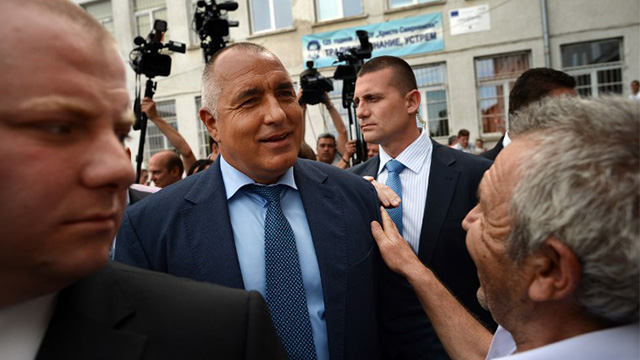SUMMARY
This is AI generated summarization, which may have errors. For context, always refer to the full article.
 SOFIA, Bulgaria – Bulgarian ousted premier Boyko Borisov’s party came first in tense elections Sunday but fell short of a majority, exit polls showed, setting the scene for political stalemate and fresh protests.
SOFIA, Bulgaria – Bulgarian ousted premier Boyko Borisov’s party came first in tense elections Sunday but fell short of a majority, exit polls showed, setting the scene for political stalemate and fresh protests.
Three months after the biggest demonstrations in years prompted the former bodyguard to tender his government’s resignation, Borisov’s GERB party won between 30.3 and 33 percent of the vote, the exit polls showed.
In second place was the socialist BSP party on between 25.3 and 27.1 percent, followed by the Turkish minority party MRF on 6.5-11.5 percent and the ultra-nationalist Ataka on 7.3-8.5 percent.
As a result of the lack of a clear result, it remains unclear how these parties can form a government.
The first official results were not expected until late morning on Monday, with the allocation of parliamentary seats not until several days after that.
Analysts say that with no clear result, Bulgaria is likely to see a repeat of the protests that rocked the country over the winter and forced Borisov to throw in the towel.
The protests saw 7 people set themselves on fire, 6 of whom died.
Six years after joining the European Union, almost a quarter of Bulgarians live below the official poverty line, living standards are falling and poverty is on the rise.
The economy grew just 0.8 percent in 2012 and foreign investment has slumped in recent years, sending unemployment up to almost 20 percent, according to unofficial estimates.
Monthly salaries in Bulgaria, sandwiched between Turkey, Greece, Macedonia, Serbia, Romania and the Black Sea, are frozen at 400 euros ($520) and pensions at 138 euros.
Many voters feel that politicians spend too much time bickering and lining their own pockets and not enough tackling the country’s economic problems, corruption, and inequalities.
Further poisoning the atmosphere has been allegations of vote-rigging during the election campaign, including on Saturday the discovery of 350,000 illegal ballot papers at a printing firm whose owner is reportedly close to Borisov’s party.
Socialist party leader Sergey Stanishev said the discovery was “preparation for the total falsification of the elections,” calling it a “scandal unseen in Bulgaria so far.”
Five opposition parties — excluding GERB — have commissioned an independent vote count by an Austrian agency, and it is possible that the official results will be challenged.
The Organisation for Security and Cooperation in Europe (OSCE), which sent its biggest monitoring mission to Bulgaria since its first post-communism elections in 1990, was due to report its findings on Monday.
“This is the last chance of the two big parties to show that they can take responsibility,” teacher Stayko Gudzhev, 57, said outside a polling station in a well-to-do neighbourhood in downtown Sofia.
“If they don’t do it, this will be the end of both GERB and BSP.”
Asked if he hoped that elections would bring about change, Dimitar, a student, shrugged: “Hope? I just want to finish my studies and go abroad.” – Rappler.com
Add a comment
How does this make you feel?
There are no comments yet. Add your comment to start the conversation.